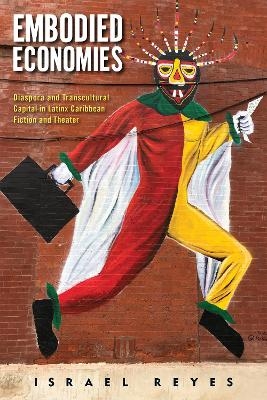
Embodied Economies
Diaspora and Transcultural Capital in Latinx Caribbean Fiction and Theater
Seiten
2022
Rutgers University Press (Verlag)
978-1-9788-2786-8 (ISBN)
Rutgers University Press (Verlag)
978-1-9788-2786-8 (ISBN)
Examines the contradictions of transcultural capital, its potential to establish networks of support in Latinx enclaves, and the risks it poses for reproducing the inequities of power and privilege that have always been at the heart of the American Dream.
How do upwardly mobile Latinx Caribbean migrants leverage their cultural heritage to buy into the American Dream? In the neoliberal economy of the United States, the discourse of white nationalism compels upwardly mobile immigrants to trade in their ties to ethnic and linguistic communities to assimilate to the dominant culture. For Latinx Caribbean immigrants, exiles, and refugees this means abandoning Spanish, rejecting forms of communal inter-dependence, and adopting white, middle-class forms of embodiment to mitigate any ethnic and racial identity markers that might hinder their upwardly mobile trajectories. This transactional process of acquiring and trading in various kinds of material and embodied practices across traditions is a phenomenon author Israel Reyes terms “transcultural capital,” and it is this process he explores in the contemporary fiction and theater of the Latinx Caribbean diaspora.
In chapters that compare works by Lin-Manuel Miranda, Nilo Cruz, Edwin Sánchez, Ángel Lozada, Rita Indiana Hernández, Dolores Prida, and Mayra Santos Febres, Reyes examines the contradictions of transcultural capital, its potential to establish networks of support in Latinx enclaves, and the risks it poses for reproducing the inequities of power and privilege that have always been at the heart of the American Dream. Embodied Economies shares new perspectives through its comparison of works written in both English and Spanish, and the literary voices that emerge from the US and the Hispanic Caribbean.
How do upwardly mobile Latinx Caribbean migrants leverage their cultural heritage to buy into the American Dream? In the neoliberal economy of the United States, the discourse of white nationalism compels upwardly mobile immigrants to trade in their ties to ethnic and linguistic communities to assimilate to the dominant culture. For Latinx Caribbean immigrants, exiles, and refugees this means abandoning Spanish, rejecting forms of communal inter-dependence, and adopting white, middle-class forms of embodiment to mitigate any ethnic and racial identity markers that might hinder their upwardly mobile trajectories. This transactional process of acquiring and trading in various kinds of material and embodied practices across traditions is a phenomenon author Israel Reyes terms “transcultural capital,” and it is this process he explores in the contemporary fiction and theater of the Latinx Caribbean diaspora.
In chapters that compare works by Lin-Manuel Miranda, Nilo Cruz, Edwin Sánchez, Ángel Lozada, Rita Indiana Hernández, Dolores Prida, and Mayra Santos Febres, Reyes examines the contradictions of transcultural capital, its potential to establish networks of support in Latinx enclaves, and the risks it poses for reproducing the inequities of power and privilege that have always been at the heart of the American Dream. Embodied Economies shares new perspectives through its comparison of works written in both English and Spanish, and the literary voices that emerge from the US and the Hispanic Caribbean.
ISRAEL REYES is a professor of Spanish and Portuguese at Dartmouth College in Hanover, New Hampshire. He is the author of Humor and the Eccentric Text in Puerto Rican Literature.
Note on Translations and Terminology
Introduction
1. A Future for Cuban Nostalgia in Plays by Nilo Cruz and Eduardo Machado
2. Decolonizing Queer Camp in Novels by Edwin Sánchez and Ángel Lozada
3. Zero-Sum Games in Fiction by Junot Díaz and Rita Indiana Hernández
4. The Gentrification of Our Dreams in Lin-Manuel Miranda’s Musical Theater
5. Race, Sex, and Enterprising Spirits in Works by Dolores Prida and Mayra Santos Febres
Conclusion
Acknowledgments
Bibliography
Index
| Erscheinungsdatum | 31.05.2022 |
|---|---|
| Verlagsort | New Brunswick NJ |
| Sprache | englisch |
| Maße | 156 x 235 mm |
| Gewicht | 513 g |
| Themenwelt | Kunst / Musik / Theater ► Theater / Ballett |
| Geschichte ► Teilgebiete der Geschichte ► Kulturgeschichte | |
| Geisteswissenschaften ► Sprach- / Literaturwissenschaft ► Anglistik / Amerikanistik | |
| Geisteswissenschaften ► Sprach- / Literaturwissenschaft ► Literaturwissenschaft | |
| Sozialwissenschaften ► Ethnologie | |
| Sozialwissenschaften ► Soziologie | |
| ISBN-10 | 1-9788-2786-5 / 1978827865 |
| ISBN-13 | 978-1-9788-2786-8 / 9781978827868 |
| Zustand | Neuware |
| Haben Sie eine Frage zum Produkt? |
Mehr entdecken
aus dem Bereich
aus dem Bereich
der stille Abschied vom bäuerlichen Leben in Deutschland
Buch | Hardcover (2023)
C.H.Beck (Verlag)
23,00 €
vom Mittelalter bis zur Gegenwart
Buch | Softcover (2024)
C.H.Beck (Verlag)
12,00 €


